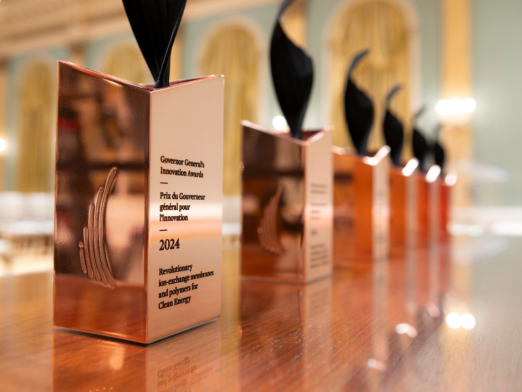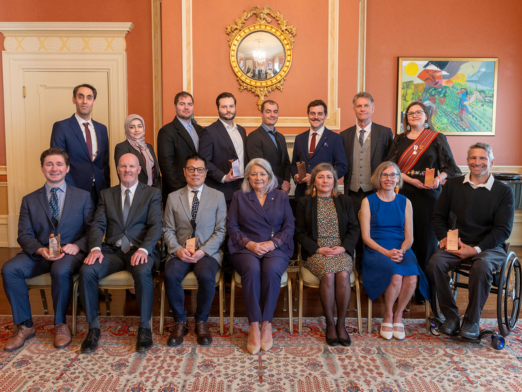The Canadian Archaeological Association Working Group on Unmarked Graves receives Governor General's Innovation Award
Caroline Gault - 22 May 2024

Photo credit: Cpl Alex Brisson, Rideau Hall © OSGG, 2024
The announcement came from the Rideau Hall Foundation (RHF) at the end of April: The recipients of the ninth annual Governor General Innovation Award (GGIA) include The Canadian Archaeological Association Working Group on Unmarked Graves (CAAWGUG), chaired by Dr. Kisha Supernant — director of the Institute of Prairie and Indigenous Archaeology (IPIA) and professor in the Department of Anthropology at the University of Alberta. This esteems CAAWGUG as one of the six “outstanding Canadian individuals, teams and organisations'' being recognized for innovation in Canada by the Governor General’s office in 2024.
The GGIA recipients are considered truly exceptional, transformative and positive in their impact on quality of life in Canada. Nominated by the Social Sciences and Humanities Research Council , the CAAWGUG is being honoured for its work in developing resources for those affected by the search for missing children and unmarked burials; for serving as an expert panel for Indigenous communities; for acting as advocates for Survivors to government; for guiding private industry; and for becoming a key public voice that has informed opinion and journalism.
“While our motivation is not about recognition,” says Supernant, “the members of the working group are grateful for this award because it brings greater visibility to the resources we have been creating to help support Indigenous communities in the difficult and sacred work of locating potential unmarked graves. The award will allow us to continue to serve the communities with whom we have the privilege of partnering.”
The CAAWGUG was formed in May 2021 and, alongside Supernant, currently includes Dr. Andrew Martindale, Dr. Lisa Hodgetts, Dr. Sarah Beaulieu, Dr. Adrian Burke, Ms. Micaela Champagne, Dr. Terence Clark, Mr. Stephen Daniel, Dr. Peter Dawson, Mr. Edward Eastaugh, Dr. Colin Grier, Dr. Scott Hamilton, Ms. Sarah Hazell, Mr. Joshua Murphy and Mr. William Wadsworth.

The working group’s guidance for Indigenous communities conducting searches includes overviews and detailed technical documents in video and written form, as well as course and training materials for Survivors, their families and their communities, leveraging years of experience and field study from working group members.
Through her work with IPIA , for example, Supernant is revolutionising the pedagogical approaches to integrate Indigenous ways of knowing and being into archaeological teaching and training. This transformation is reshaping the field to be more engaged, ethical and empathetic towards the individuals and communities whose histories archaeologists have the honour of exploring.
Supernant considers it “heart-centred” archeology, as they continue to gain a better understanding of how complicated it can be to find the answers that families of missing children deserve. “I will never get used to walking over the land that may hold the unmarked graves of Indigenous children,” she writes in a first-person account of the experience for Scientific American .
Leading with empathy and lived experiences from group members and Indigenous communities in Canada, the CAAWGUG emphasises the heavy emotional work involved for those considering embarking on a search and stresses the importance of mental health support, providing extensive mental health resources on its website and in course material.
On May 14, 2024, Supernant joined the 2024 GGIA Laureates at Rideau Hall during Canadian Innovation Week to accept the award for the CAAWGUG’s innovative work .